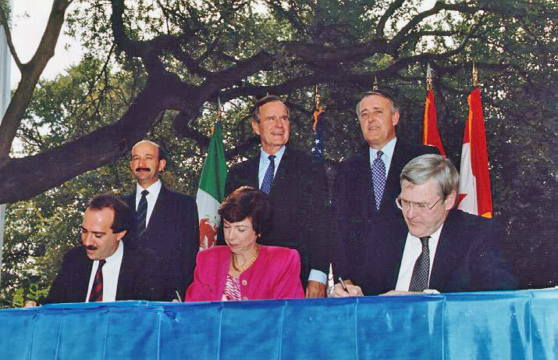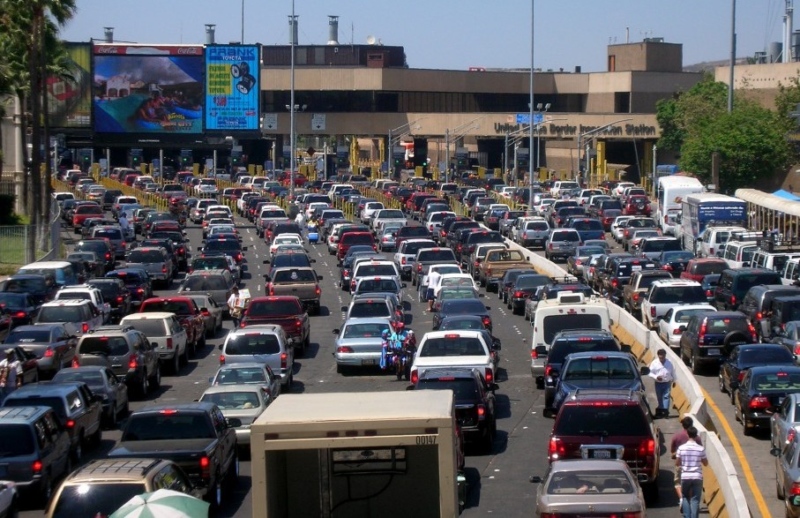
What are the Best Options for Modernizing NAFTA?
How significant of a priority should strengthening NAFTA be as compared to other trade agreements?
A Daily Publication of The Dialogue
Q: The U.S. Department of Transportation announced last month that Mexican trucking companies will be able to apply to make long-haul trips in the United States. Transportation Secretary Anthony Foxx said the policy change will strengthen the United States' relationship with Mexico and meet U.S. obligations under NAFTA. How will the change affect the countries' trade relationship? What will be the economic impact in the United States and Mexico? Have concerns raised in the United States about perceived safety hazards and pollution caused by Mexican trucks been adequately addressed?
A: Fred McLuckie, director of the Department of Federal Legislation and Regulation at the International Brotherhood of Teamsters: "We do not think the change will have a significant impact on the U.S.-Mexico trade relationship. Our trade deficit with Mexico spiked upward with the implementation of NAFTA to a high of almost $75 billion in 2007, but it has leveled off somewhat over the past five years in the $55-65 billion range. The method of transporting goods between countries has less of an impact than the economics that might permit Mexico's citizens to purchase more American-made goods. Theoretically, the drayage operations in the border zones may disappear, which would have a significant economic impact on cities along the border. But that won't change until Mexico starts buying more U.S. goods. Mexico-domiciled carriers are not going to make trips into the interior of the United States unless they have a back-haul load. Returning to Mexico with an empty trailer is not economically feasible for Mexican carriers. That was clearly demonstrated by the carriers in the pilot program. Safety issues and serious questions still remain. The U.S. Department of Transportation's recent Inspector General report made clear that the pilot program that brought Mexican trucks into the United States was a failure. The pilot program was based on flawed data that cannot project the safety performance of Mexico-domiciled carriers. The report said we do not have the data we need in order to determine whether or not the requirements have been met. Mexico's own enforcement of its safety regulations, ranging from hours-of-service to drug testing, is still questionable. Issues have also been raised about Mexico lagging behind in its approach to implementing emission standards and that Mexico does not have an established norm for fuel standards. The Mexican government has failed to raise standards for truck safety and hours-of-service requirements and is deflecting from its responsibility to improve standards. Mexico claims an open border for U.S. trucks into the country, allowed for under NAFTA. However, it cannot ensure the safety of the drivers or their cargo. The Teamsters Union has been a staunch advocate for highway and worker safety, while the Mexican government falls far short on these basic and necessary standards."
A: Arturo Sarukhan, board member of the Inter-American Dialogue and former Mexican ambassador to the United States: "The two decade-long non-compliance of the United States with its treaty obligations under NAFTA was really never about the safety of American roads or drivers. That argument, successfully advocated by the Teamsters and their allies in Congress since 1995, was merely a red herring; it was--and has always been--about protectionism, pure and simple. While not perfect and certainly very limited in scope and participation, the demonstration program that had been in effect for the past few years and which was a direct response to the retaliatory measures equivalent to $2.4 billion that Mexico surgically imposed on specific U.S. exports in March 2009, underscored the benefits of free and fair cross-border trade. For example, one participating carrier saved more than $600,000 a year by cutting trip times and fuel costs. Another saved an estimated $188,000 in transfer fees during the nine months that it participated in the program. Mexico is the United States' third largest trading partner and second largest buyer of U.S exports. Both our nations are trading close to $1.4 billion a day in both directions. The savings and benefits that will accrue as a result of the important resolution of this long-festering and very frustrating bilateral trade dispute will benefit both producers and consumers on both sides of our border. It will enhance our competitiveness and our unique and singular success in developing joint production and supply platforms in North America and even reduce pollution along our border and at our ports of entry as a result of trucks not having to stop to unload and load again. Fewer and newer Mexican long-haul trucks will replace smaller and older trucks that now huff and puff their way to the border. But by finally moving forward and transitioning from the demonstration program to the long-overdue and extremely welcome full-fledged access for Mexican long-haul trucks, the Department of Transportation and the administration are ensuring a level playing field for trade and bolstering the perception that the rules-based system that binds us together is being applied on both sides of our border."
A: Amy Glover, director at McLarty Associates: "Bringing the United States into compliance with NAFTA's trucking provisions will remove a longstanding trade irritant with Mexico, the United States' third-largest trading partner. Mexican trucks and their drivers will have to comply with the same strict standards applied to U.S. and Canadian trucks, and their ability to do so was clearly demonstrated under the recently completed pilot program. This issue was always more about protectionism than it was about legitimate concerns over compliance with U.S. safety and environmental standards anyway. In the short run, the ability to have Mexican trucks deliver merchandise within the United States will not appreciably increase the flow of goods. It will likely take time for companies to take advantage of this new possibility, and there are logistical and practical matters at play. Previously, merchandise had to be unloaded at the border and reloaded onto a U.S. truck in order to reach the final destination, implying needless inefficiencies and costs. By solving this issue, regional competitiveness will receive a boost, but customs brokers are likely to try to retain their rents as long as possible, and it may take time for companies to route their merchandise deliveries differently. Mexican trucks are not allowed to engage in cabotage in the United States, which will make delivering merchandise far afield of the border less attractive, unless the trucks are able to load shipments in the United States for return delivery into Mexico. There is no doubt that this is very good news for the U.S.-Mexico trade relationship and that after 20 years this represents a victory in favor of U.S. compliance with an international treaty. The measure will help contribute to greater efficiency at the border, where much still needs to be done to increase competitiveness generally."
How significant of a priority should strengthening NAFTA be as compared to other trade agreements?
Michael Shifter fue entrevistado por Gerardo Torres de El Salvador sobre los temas más destacados en la agenda regional. Entre otros asuntos, Shifter habló sobre el futuro de la paz en Colombia, la crisis política y económica en Venezuela, y el impacto de las elecciones de Estados Unidos en la región.
Will President-elect Trump shatter America’s most important bilateral relationship?
 Magnus Manske / CC BY-SA 3.0
Magnus Manske / CC BY-SA 3.0

